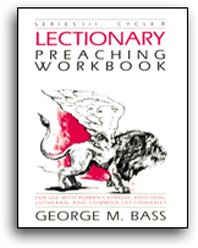SermonStudio
Proper 10
Preaching
Lectionary Preaching Workbook
Series III
The weekly rhythm of the church year should be clearly perceived by the preacher by this time of the year. It has been established by the regular celebration of the resurrection of our Lord, the "Little Easter." During Pentecost, it is reinforced by the days of saints and martyrs which occur during the cycle and season.


